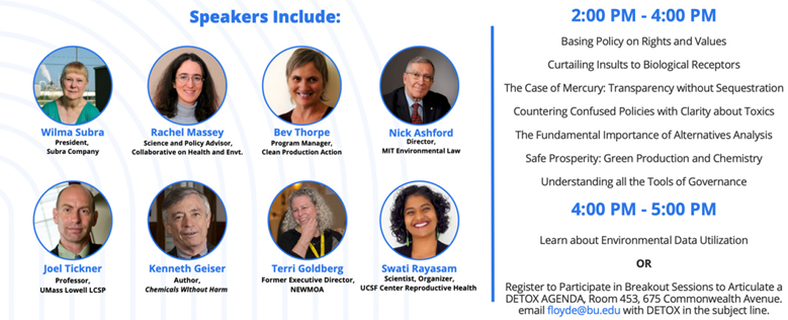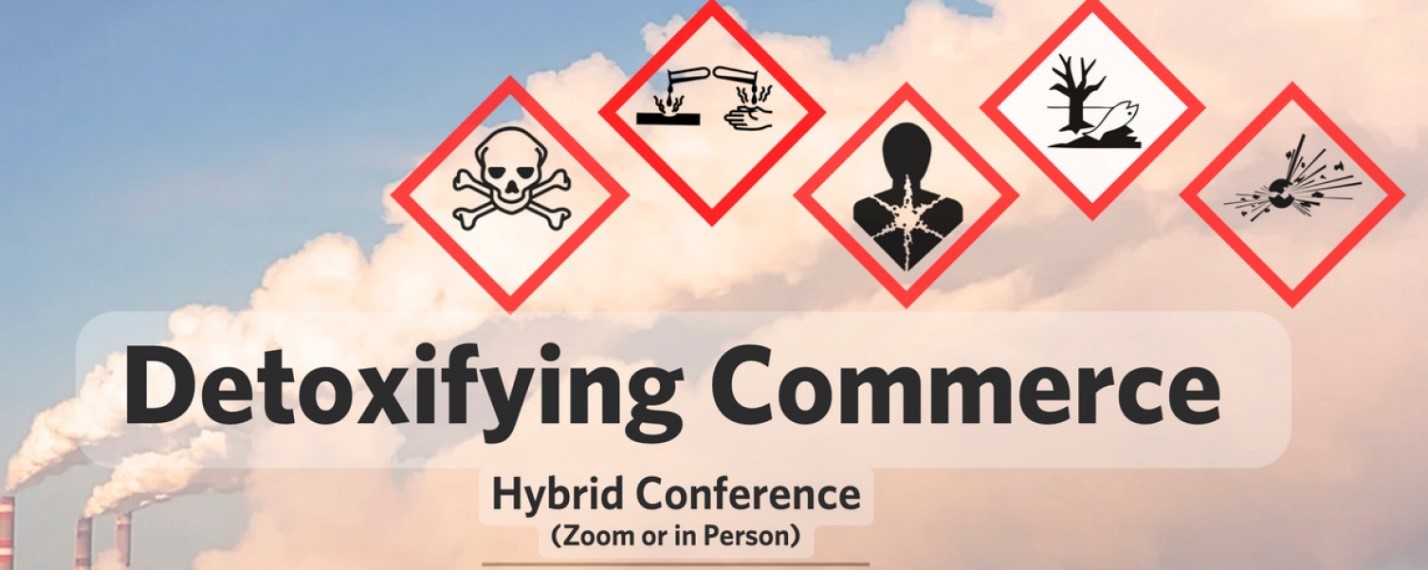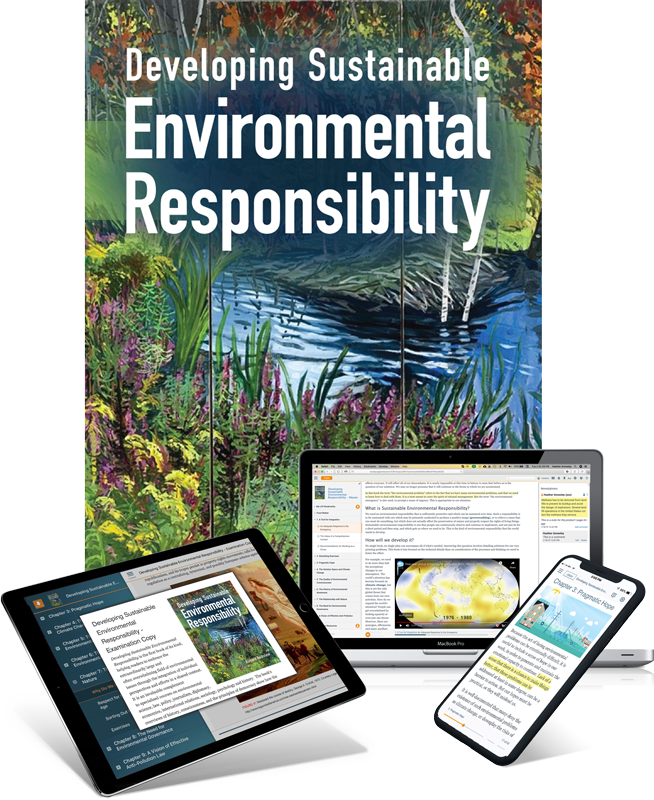Law for Sustainability, Sustainability Policy and Events

This environmental citizen (definition: not a person who is environmentally exemplary, but a person who sees that learning about how to be more environmentally responsible is part of being a citizen of one’s country and the world) has been quiet on this spot, but active elsewhere. Please go to www.bu.edu/rccp and click on Events in the Banner. Then click on the conference Detoxifying Commerce.
It will be on April 19 – a date when ordinary people, available “in a minute”, stood down the British Army. We have just had Passover celebrations involving the opportunity of the Red Sea miraculously opening, to cross into freedom. We remember that it was not easy but thank god (definition: your own) it happened and let it happen for everyone now in slavery. The feeling of freedom is in the air with the rebirth of spring.
A good time then, it would seem, to free ourselves from toxic threats. The toxicity of our continued consumption of products made in a way that is efficient for producers in today’s system, rather than what makes sense biologically or ecologically, let alone in terms of justice, takes many forms. It involves distortion of science, politics, and simple everyday cognition, as well as insults to every organ in the body and every form of life we know. Toxicity is a term that has taken on many meanings, from unjustified attacks on independent scientists who threaten corporate interests, to cold indifference on the part of those representatives who protect moneyed rather than human interests, to twisted judicial reasoning that keeps outmoded laissez-faire policies in place and disrespects concepts of justice. It is not just literal poisons, corrosives, hazardous substances, hepatotoxins, neurotoxins, carcinogens, mutagens, teratogens, endocrine disruptors, sensitizers, asthmagens, explosives, flammables, reactives, nanoparticles, solvents, delirients, asphyxiants, and so on. It is that we tolerate their dispersion. We need not.
When told about an upcoming conference on Toxics Policy April 19, students in one class seemed nonplussed. When asked why they didn’t seem interested, responses such as “it’s overwhelming” and “there’s nothing you can do” were received. Other encounters during a career in toxics use reduction have involved such thoughts as “chemicals are all around us”, and “they are the price we pay for modern society”. The point of this conference is that we don't need to be endangering ourselves and everything else like this, and can stop.
Changing to safer materials and systems that are ecologically intelligent and humane is achievable and imperative. Yes, to suddenly change the rules can be disruptive but the goal of a vastly less toxic modern world is no great stretch. The capacity for green transformation has been demonstrated. We, as a society, can shrug off confusion about what’s important, abandon apathy and learned helplessness, and advance towards real, effective agency by using stronger governance to stop releases and exposures, and much more assistance, intelligently provided. These tools of governance have been proven to work. We only need to determine that we have the responsibility to use them. De-poisoning is a choice we can make. Toxics Use Reduction works and benefits the companies now using toxics, as well as the rest of us.
I try to tell this story in my book, Reconstructing Environmental Governance (Rowman and Littlefield, 2022), but on April 19 I will have some world-class experts tell it for me. I cannot tell you how proud I am to have Ken Geiser, a creator of the Toxics Use Reduction Act, founder of groups doing the work for a cleaner world; Nick Ashford, the first to write about Options Analysis, the approach not of forcing people to do something in particular, but of flexible regulation - having them examine their options, a concept now so well elaborated as Alternatives Analysis, in writings and trainings and meetings led by Joel Tickner, and informed by the very careful thinking of pollution prevention policy expert Rachel Massey, who has worked at the intersection of science and policy and economics and helped others through those thickets; and long-time hero of mine Wilma Subra, and new hero Swati Rayasam, fighters for real science and against the toxicity of biased science; and Terri Goldberg, who brought so many to coordinated work, multiplying the efforts of individual programs, and held together projects with diverse interests and over long periods of time; and Bev Thorpe, who with Clean Production Action works with and embodies green and responsible industry. These people stand against the toxic threats and move us forward to a better place.
We are inviting Boston-area students to come in person, and the presentations will be followed by a tutorial on using environmental data (with an apt name for a university-based initiative - Environmental Data Utilization, EDU); or students can join break-out discussions on what our Detox Agenda should be. The reports from those breakouts will be a product of this conference, and we hope they will show movement – from learned helplessness to making the right things happen.
But the event is not just for students - it is for all the varieties of environmental citizen.
Register here: https://www.bu.edu/rccp/2023/04/06/detoxifying-commerce/
Changing to safer materials and systems that are ecologically intelligent and humane is achievable and imperative. Yes, to suddenly change the rules can be disruptive but the goal of a vastly less toxic modern world is no great stretch. The capacity for green transformation has been demonstrated. We, as a society, can shrug off confusion about what’s important, abandon apathy and learned helplessness, and advance towards real, effective agency by using stronger governance to stop releases and exposures, and much more assistance, intelligently provided. These tools of governance have been proven to work. We only need to determine that we have the responsibility to use them. De-poisoning is a choice we can make. Toxics Use Reduction works and benefits the companies now using toxics, as well as the rest of us.
I try to tell this story in my book, Reconstructing Environmental Governance (Rowman and Littlefield, 2022), but on April 19 I will have some world-class experts tell it for me. I cannot tell you how proud I am to have Ken Geiser, a creator of the Toxics Use Reduction Act, founder of groups doing the work for a cleaner world; Nick Ashford, the first to write about Options Analysis, the approach not of forcing people to do something in particular, but of flexible regulation - having them examine their options, a concept now so well elaborated as Alternatives Analysis, in writings and trainings and meetings led by Joel Tickner, and informed by the very careful thinking of pollution prevention policy expert Rachel Massey, who has worked at the intersection of science and policy and economics and helped others through those thickets; and long-time hero of mine Wilma Subra, and new hero Swati Rayasam, fighters for real science and against the toxicity of biased science; and Terri Goldberg, who brought so many to coordinated work, multiplying the efforts of individual programs, and held together projects with diverse interests and over long periods of time; and Bev Thorpe, who with Clean Production Action works with and embodies green and responsible industry. These people stand against the toxic threats and move us forward to a better place.
We are inviting Boston-area students to come in person, and the presentations will be followed by a tutorial on using environmental data (with an apt name for a university-based initiative - Environmental Data Utilization, EDU); or students can join break-out discussions on what our Detox Agenda should be. The reports from those breakouts will be a product of this conference, and we hope they will show movement – from learned helplessness to making the right things happen.
But the event is not just for students - it is for all the varieties of environmental citizen.
Register here: https://www.bu.edu/rccp/2023/04/06/detoxifying-commerce/

 RSS Feed
RSS Feed

